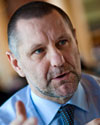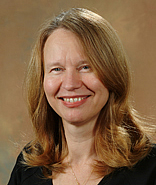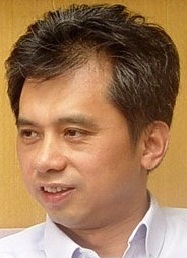ACMSA 2013
Keynote Speakers
Prof. Steve Evans (University of Cambridge, UK)
Director of Research in Industrial Sustainability

Steve Evans spent 12 years in industry, rising to become Engineering Systems Manager at Martin-Baker Engineering, the world leading manufacturer of ejection seats. His industrial experience led to an emphasis on improving engineering performance and provided an excellent grounding for tackling complex, real-life problems.
Steve has over 20 years of academic experience which includes working collaboratively with leading industrial and academic institutions from around the globe and supervising over 120 PhD. and MSc. students at Cranfield. His research seeks a deep understanding of how industry develop solutions that move us towards a sustainable future. He researches and conducts projects with organisations to improve their performance in various dimensions.
“A future for manufacturing – from the perspective of sustainability”
Abstract: Manufacturing has delivered wonderful economic success globally, and enabled many to access the products that improve our lives. These economic and social goods have been delivered simultaneously with negative environmental and social impacts. This presentation proposes that the manufacturing sector can learn to balance economic, social and environmental impacts and shows how some leading manufacturers are achieving this already. The next stages of development for the manufacturing sector will form a new industrial revolution and the key dimensions of that revolution are discussed. Possible solutions that will allow manufacturing to be a net-positive contributor are explained, which form a framework for long term industrial sustainability.
Prof. Kathryn E Stecke (University of Texas at Dallas, USA)
Fellow of INFORMS

Dr. Kathryn E. Stecke teaches in the Jindal School of Management at University of Texas at Dallas as the Ashbel Smith Professor of Operations Management. Previously she taught for 21 years at The University of Michigan Business School. She received an M.S. in Applied Mathematics, and an M.S. and Ph.D. in Industrial Engineering from Purdue University. She has authored numerous papers on various aspects of FMS planning and scheduling in numerous journals including The FMS Magazine, Material Flow, International Journal of Production Research, European Journal of Operational Research, IIE Transactions, IEEE Transactions on Engineering Management, Annals of Operations Research, Performance Evaluation, International Journal of Strategic Decision Sciences, International Transactions in Operational Research, Naval Research Logistics, Manufacturing and Service Operations Management, Management Science, Operations Research and several proceedings and book contributions. She is the Editor-in-Chief of both the International Journal of Flexible Manufacturing Systems and Operations Management Education Review.
“Seru Production System: An Organizational Extension of JIT” (Note: seru means Japanese style cellular manufacturing)
Abstract: A seru system is a new type of production system, widely used in Japan but unknown outside of Asia. Developed by Sony, it is used in all of Canon’s factories. It is more flexible, efficient, and productive than conventional manufacturing systems, for the industries in which it is appropriate. Seru’s history, development, and benefits will be described and discussed.
Prof. Jian Chen (Tsinghua University, China)
Chair, Department of Management Science and Engineering, Tsinghua University

Professor Chen has authored/co-authored 178 papers in refereed journals, including Annals of Operations Research,Data Mining and Knowledge Discovery,Decision Support Systems,European Journal of Operational Research,IEEE Transaction on System, man and Cybernetics—Part A: systems and human,IIE Transactions,Information Science,International Journal of Production Economics,Omega, The International Journal of Management Science,Naval Research Logistics,Operations Research Letters,Production and Operations Management, Systems Engineering-Theory & Practice, Journal of Management Science in China, etc. Professor Chen has been a principal investigator for over 30 grants or research contracts with National Science Foundation of China, governmental organizations and companies. He has been invited to present several Keynote/Plenary lectures at Conferences. He is the recipient of Award for Outstanding Research in Natural Sciences/Award for Outstanding Research in Science and Technology Progress/Award for Outstanding Research in Humanities and Social Sciences by Ministry of Education, Fellow of IEEE, IBM Faculty Award, Ministry of Education Changjiang Scholars, National Award of Teachers for Guidance for Excellent Doctoral Dissertation Paper by the Minstray of Education of China and Academic Degree Commission of the State Council,Fudan Management Excellence Award, Science and Technology Progress Award by Beijing Municipal Government,Young Scientist Award of China by the Ministry of Personnel of China and China Association for Science and Technology, etc.
“Can Me-Too Products Prevail?–Evidence from China”
Abstract: Existing literature in technology learning and capability accumulation has long held the claim that, for a certain period of time in their development, firms in latecomer countries rely on their counterparts in developed countries to get new product ideas. However, existing research in this area is generally based on case studies and historical analyses. We intend to fill this important gap. Using large scale, nationwide survey data from China, we explore specifically whether learning new product ideas from leading firms in foreign countries leads to higher performance results than choosing other sources of ideas in an emerging market at the early stage of its evolution. To assure the robustness of our results, we compare the performance effects from three dimensions: customer-based performance, financial-based performance and technical-based performance. Implications to the managers and policy makers are also discussed.





